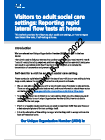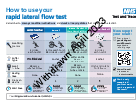Coronavirus (COVID-19) testing for adult social care settings
Outlines the COVID-19 testing available for testing staff, residents and visitors for all adult social care settings.
Applies to England
Documents
Update history
2023-03-31 16:15
Notice added to ‘COVID-19 testing in adult social care’ about upcoming withdrawal of guidance.
2022-12-15 15:03
Updated ‘COVID-19 testing in adult social care’ to streamline outbreak testing in small care homes in line with the latest evidence and to advise when rapid response testing is relevant for small care homes.
2022-11-14 11:55
Replaced information in How to use your rapid lateral flow tests for MP Biomedicals Rapid Antigen Tests with SureScreen tests.
2022-09-08 15:46
Updated care home outbreak testing for COVID-19 flowchart in line with the pause to routine asymptomatic testing.
2022-08-24 16:53
Updated in line with the pause to routine asymptomatic testing from 31 August.
2022-05-09 15:01
Added care home outbreak testing flowchart: staff and residents (PDF and HTML versions).
2022-04-19 15:33
Updated COVID-19 testing in adult social care.
2022-03-31 16:07
Added COVID-19 testing in adult social care guidance.
2022-02-16 16:05
Added updated information regarding vaccination and testing. Moved the instructions for use for SureScreen 25 rapid lateral flow tests to:
2022-02-04 09:03
Updated COVID-19 testing available for adult social care in England: a summary.
2022-01-18 09:48
2022-01-06 17:18
Removed on-site testing and self-test attachments and added ‘Step-by-step guide to COVID-19 self-testing: SureScreen 25 pack nose-only test’.
2021-11-01 09:30
Added How to use your rapid lateral flow test (PDF and HTML versions).
2021-10-13 15:21
Updated to reflect policy has now changed regarding self-isolation for fully vaccinated individuals following contact with a COVID-19 positive case. References to lockdown also removed to reflect the easing of national COVID-19 restrictions.
2021-09-24 17:30
Updated to reflect changes to policy when there is one case of COVID-19 in a care home, rapid lateral flow testing frequency, changes to policy when there are 2 or more cases of COVID-19 in a care home and changes to ending outbreak restrictions, when they can lifted and ongoing testing after this period.
2021-05-20 12:00
NHS helpline number for Scotland changed to 119.
2021-03-24 12:14
First published.




